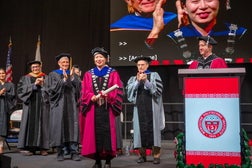When's the right time to pursue one? When you realize you need it – and that's different for everyone

Experience can be your best teacher. It can also tell you when it might be a good time to pursue an MBA.
“When you realize you need your MBA, that's a good time to get it,” said Sandra Wellinghoff of Worcester Polytechnic Institute (WPI), who directs its Blended Learning program, a combination of in-classroom and online education. Today, students are waiting as much as 20 years to receive their master of business administration degree. In fact, most wait until they have some work experience before aiming for an advanced degree.
“It's best to wait two years to get your MBA. Get your experience in the workforce first and figure out: Why do you want to get your MBA?” Wellinghoff said.
She believes a student needs to find the right fit, before deciding which program to pursue.
Questions to consider once deciding to pursue an MBA include:
• What kind of program would best suit your needs?
• Should it be a general MBA program or one targeted at a specific industry or discipline?
Many colleges offer specialty MBA programs in which students can focus on such areas as human resource management, marketing, accounting or health care management.
Nonetheless, getting that degree is “a lot of work,” Wellinghoff said, no matter when you pursue it. Therefore, it's crucial you get your degree at an appropriate time in your life.
Twenty-year wait
Debbie laCortiglia, a WPI student enrolled in an MBA program with a focus on innovation and entrepreneurship, waited 20 years before jumping back into the classroom. She's enrolled in a cohort program that allows students to finish in 2½ years with the same group of students, building connections on a team as they work.
Most students in the program have been in their careers for a few years first. The average age of a student in the cohort program is around 35, according to laCortiglia.
And laCortiglia, in her early 40s, has no regrets about waiting that long to continue her education. “At this stage in my career I was able to afford the education and it has given me a kick-start into the next phase of my career,” she said. “My advice to someone considering getting their MBA is to find the right program; there are many options.”
She works full time as an IT director, “For me, it is already paying off in my current role, and it has given me the knowledge and tools to be confident and take ownership of my career and take it to the next level.”
Another benefit, laCortiglia said, is the new network she has formed at school.
Educators say it's essential that students have a taste of the business world before stepping foot in it.
“We want to graduate principled business leaders who will go beyond the bottom-line objectives of a business and will think of the impact of their decisions on the community at large and their employees,” said Eric Drouart, professor and director of the MBA program at Assumption College.
Assumption's program, which has been active for more than 30 years, focuses on business ethics. Students can also engage in international business studies, as some students traveled to Poland and Italy over the last two years. This allows them to develop marketing and business strategies while gaining experience on a global level.
Drouart believes real business experience is invaluable to students pursuing an MBA. “Employers recognize the MBA degree as indication of professional business mastery. People already having experience in the business world will get an MBA to add value to their experience for potential promotion and advancement opportunities in their profession,” he said.
Elizabeth “Libby” O'Hara, visiting assistant professor of business, who oversees the Assumption's MBA concentration in sport business and leadership, believes it is important to give students real-life experience while they're earning their degree. She said students intern with the Boston Red Sox, New England Patriots and the Doug Flutie Foundation, among other organizations tied to sports.
“Each student is assigned a mentor from the sport field,” she said. “We as faculty and mentors are committed to Assumption MBA students reaching their professional goals and ultimate success.”
Two in one
Some colleges, such as Clark University in Worcester, even offer dual degree programs that allow students to earn two master's degrees in three years.
“The idea is learning deeply in an area they want to focus in, by getting successful management skills,” said Catherine Usoff, dean of Clark's Graduate School of Management. “Part-time students coming back received a promotion due to their MBA. It's really paying off in terms of career progression.”
Usoff also recommends that students get themselves established in their careers before they come back to pursue an MBA. That helps them develop communication, leadership and other real-world skills.
Many programs, such as Framingham State University's, combine theory with real-life experiences.
“We looked at market trends and together with our board of advisors comprised of people from surrounding industries, we have designed a program that we believe includes the 12 critical areas that an MBA graduate needs to be trained on be successful,” said Jorge Riveras, director of Framingham State's MBA program and assistant professor of strategy and international business.
It's important to get a sense of the business world when a student is in the classroom, he said. Applying concepts from the classroom to actual situations allows the student to develop the skills they need to succeed.
Riveras and others involved with the MBA program, he said, “come from the corporate world, and we can relate to what applicants are going through. We clarify any doubts they have, explain the content and advantage of our courses and talk with them about working life and career opportunities. We are here to educate.”
It's imperative that a student be enrolled in an MBA program that is challenging and that gives the student a competitive edge, according to Joe McAloon, a professor and coordinator of the MBA program at Fitchburg State University. This allows workers to bring more set skills to the table, skills their colleagues may lack, he said.
“Students can come into the program right after school or wait until they have worked for a while,” McAloon said. “There are advantages and disadvantages to both.”
Either way, he said, “You need the competitive advantage of having the MBA.”
Brittany Lopriore is an editorial intern at the Worcester Business Journal.













0 Comments